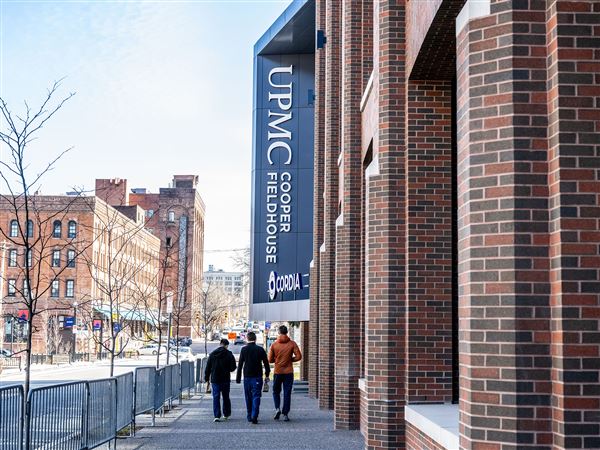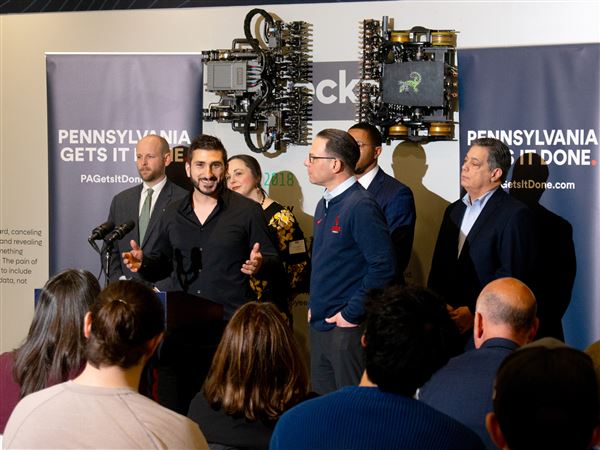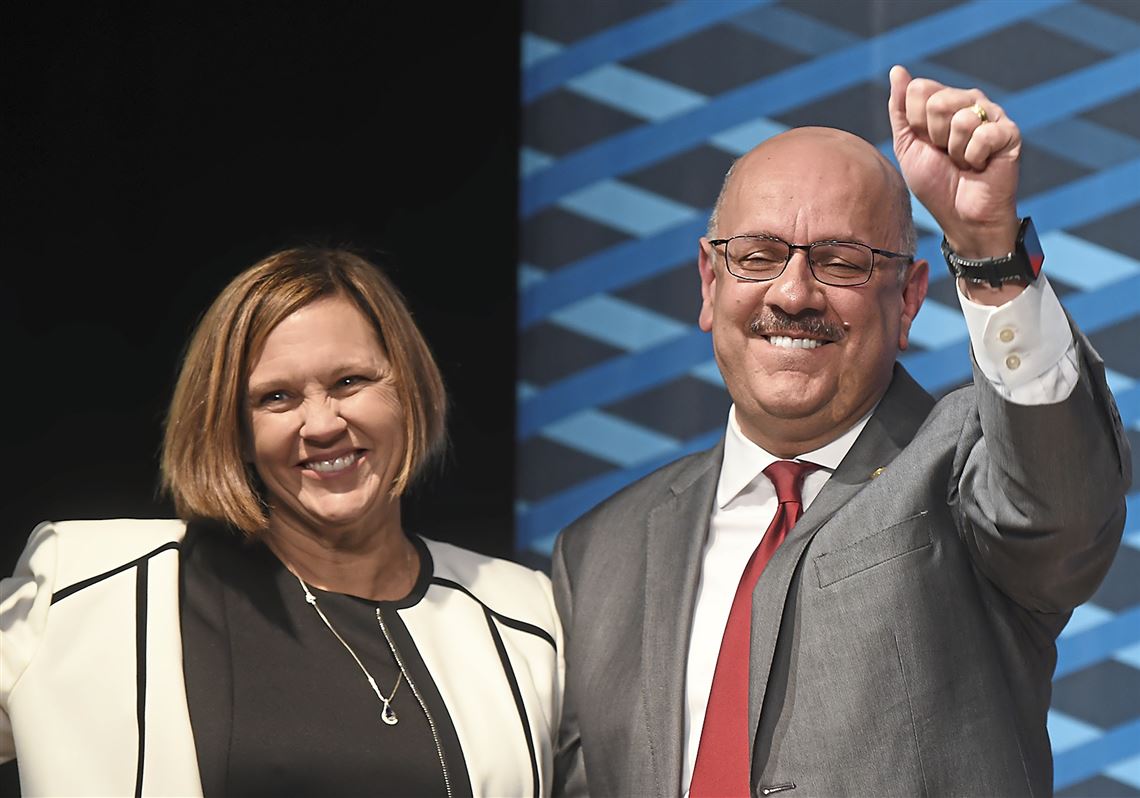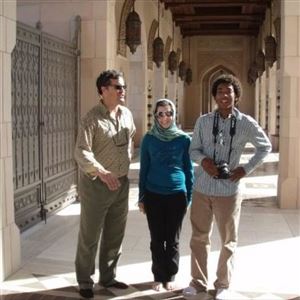When an institution like Carnegie Mellon University elevates its former provost to the presidency, it’s the smallest of details that can do the most to illuminate the man.
For instance, Farnam Jahanian, 57, is a dog lover. His family’s pooch, “Penny” is a year-old schnauzer-shih tzu mix, "small, as you might expect, hyper but very affectionate" and often seen at events on the research campus that Mr. Jahanian now leads.
His 29-year marriage to Teresa, or "Tris," suggests how well two computer scientists can mesh, even if the conversation might occasionally turn arcane. On their very first date decades ago, "We found ourselves waiting in a movie theater talking about computing and operating systems."
And, as for leading a university where your daughter is an undergraduate, the Iranian-born scholar seemed like a father well-schooled in walking that delicate line as he addressed a crowd Thursday in the Jared L. Cohon University Center.
"My daughter Sara, who is more than halfway through her junior year here: I love you. . .," he said. "Thanks for always letting me embarrass you in front of your friends – it started in kindergarten and continues to this day."
The audience of several hundred students, employees and others laughed as the statistics major, one of the couple's three children, sat smiling with her mother in the front row of the university center’s Rangos Auditorium.
In his formal noon-hour remarks and in a brief interview afterward, Mr. Jahanian, who until Wednesday was the school’s interim president, talked about his family and his enthusiasm for what he called "a great privilege and a tremendous responsibility."
Just hours before, an email to campus had announced a board of trustees' unanimous vote the day before to make him Carnegie Mellon's 10th president.
Mr. Jahanian, a nationally prominent scientist, entrepreneur and administrator, came to CMU in 2014 and served as vice president for research and later as provost. He assumed the interim presidency when Subra Suresh resigned effective June 30 after four years in the job.
Mr. Jahanian has a career spanning three-plus decades in academia, industry and in the public realm, including 21 years at the University of Michigan. He came to CMU from the National Science Foundation, where he headed the Directorate for Computer and Information Science and Engineering from 2011 to 2014.
The vote by CMU’s board Wednesday solidified his place atop an internationally known research university that is an anchor of the Pittsburgh region’s high-tech economy. The campus has long prided itself on work across the disciplines, from engineering and computer science to theater and music.
Its researchers spawned the field of artificial intelligence in the 1950s, and today the campus is among the world’s foremost robotics centers, with so many robots spread out on campus doing so many things that it took a robot census to count them.
But in addition to pressures felt in general by elite institutions, Carnegie Mellon has an added worry: an endowment to support its endeavors that is dwarfed by those held by competitors, among them Cornell and Stanford universities and the Massachusetts Institute of Technology.
In the email announcing the appointment, James E. Rohr, chairman of CMU’s board of trustees, called Mr. Jahanian a leader with vision and a deft understanding of human nature.
“A rigorous, international search over the last eight months has made it clear that Dr. Jahanian possesses a rare set of qualities and experiences that make him exactly the right leader for this university at this extraordinary moment in its history,’’ Mr. Rohr wrote.
“In short, Dr. Jahanian embodies a bold, boundary-crossing, creative approach to the most important issues of our time — the very qualities that define and differentiate Carnegie Mellon.”
Mr. Jahanian’s scholarship has enhanced the field of computer science, Mr. Rohr said, and his experience as an entrepreneur gives him first-hand understanding of what it takes to bring knowledge to market.
“Just as importantly, during his time as provost and interim president, Dr. Jahanian has led this institution with an irresistible urgency and a determination to seize the opportunities at hand,” said Mr. Rohr.
That approach has enabled deans, senior administrators, faculty, staff and students “to pursue excellence at every level of their work,” he added.
Officials of the private university said their search that began last fall was confidential, and, as such, they declined to specify the number of applications received and from how many countries. The length and term of Mr. Jahanian’s contract was not disclosed, nor was his compensation.
His predecessor, Mr. Suresh, made $1,205,311, including $775,507 in base pay, The Chroinicle of Higher Education reported in December, using 2015 survey data. Following his departure from Pittsburgh, Mr. Suresh was announced as the new president of Nanyang Technological University Singapore.
Mr. Jahanian is the author of 100 research papers and has served on numerous national advisory boards.
His research in network routing and security spawned the Internet security company Arbor Networks, which he co-founded in 2001 and was its chairman until its acquisition in 2010.
The youngest of six childrren, Mr. Jahanian came to the United States from Iran at age 16, having persuaded his parents in 1977 to let him attend high school in San Antonio, Texas.
He received a bachelor of science degree in mathematics, computer science and system design in 1982 from the University of Texas at San Antonio. He received a master’s degree in 1987 and a doctoral degree in 1989, both in computer science, from the University of Texas at Austin.
Between 1993 and 2014, Mr. Jahanian worked at Michigan, where held the Edward S. Davidson Collegiate Professorship in the College of Engineering, served four years as chair for computer science and engineering and directed the Software Systems Laboratory from 1997 to 2000.
His remarks Thursday touched on the power of higher education to open doors as in his own life, and its ability to bridge race, economic and geogprahic divides. He spoke of Carnegie Mellon’s rich array of knowledge from neuroscience and robotics to business and the performing arts and humanities.
“But what truly defines us as an institution is not any one school, discipline, or award,” he said. “Deep in our DNA, we are about problem-solving and fearless creativity at the edges and intersections of traditional boundaries.”
Bill Schackner: bschackner@post-gazette.com, 412-263-1977 and on Twittter" @Bschackner.
First Published: March 9, 2018, 1:00 p.m.



















